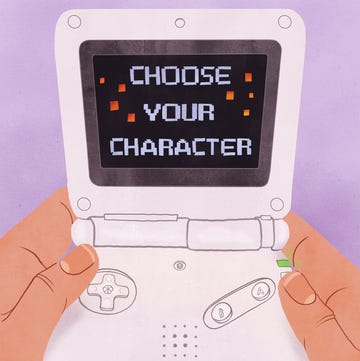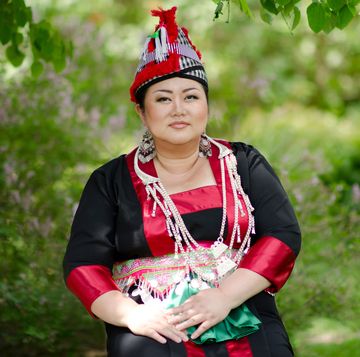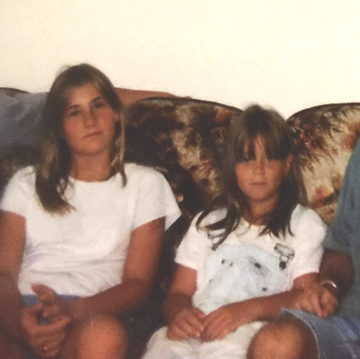How do you stand up to online harassment?
If you're a woman doing anything online, you probably already have a few stock answers: ignore, push back defiantly, rally some backup to lend their digital voices to your cause, liberal use of the block button. Or, if it gets bad enough, you report the abuser to whatever online platform you're using and hope that's the end of it.
If you are lucky, that's the end of it.
If you are a woman speaking out about Gamergate, that is not the end of it.
If you haven't yet heard of Gamergate, congratulations! You've spared yourself exposure to some of the slimiest antics on the Web. Ostensibly about "ethics in video game journalism"—whatever that means—Gamergate has essentially amounted to an angry online mob of deranged sexists harassing and bullying women who dare to speak out against the sexist and misogynistic culture of video games and the gaming industry. (See: Grand Theft Auto. Need I say more?) Occasionally, this mob took it offline, like when they hounded video game designer Brianna Wu out of her home and got Anita Sarkeesian's speaking engagement canceled thanks to a bomb threat.
Gamergate has no clear leader, but it does have a unifying goal: to silence women. Now they're at it again, this time targeting South by Southwest (SXSW), the annual mecca of panels and parties held in Austin, Texas.
Some background: Every year, during the summer, SXSW asks for proposals for panels. Every year, the SXSW community votes on those panels to help decide which ones should be chosen for the big show. This year a panel about online harassment in the gaming industry called "Level Up: Overcoming Harassment In Games" was submitted by programmer and anti-harassment activist Randi Harper to be a "solutions-oriented talk" addressing "harassment in the online world."
The panel was targeted by Gamergate for downvoting en masse—a typical technique used to silence Gamergate's perceived enemies —but was nonetheless selected for the conference...along with another panel submitted at the last minute by members of said Gamergate community (and not voted on). That panel was ostensibly included by the SXSW organizers as a sort of counterpoint.
This was announced last week. Understandably, many people were outraged that SXSW would deem this an issue in need of a counterpoint, particularly by the harassers in question. Oh sure, the panel was called "SavePoint: A Discussion on the Gaming Community" and not "How to Hound Women off the Internet," but the use of stock Gamergate phrases like "the journalistic integrity of gaming's journalists" made the mission pretty clear. Also, as Arthur Chu details over at the Daily Beast, it was clearly planned and executed by Gamergate members online.
Outrage grew. Online forums like Twitter got noisy. SXSW took some heat—and apparently received "numerous threats of on-site violence related to this programming." So, a week after announcing them, SXSW canceled both panels. Both panels—except only one was a Gamergate panel. The other was about harassment, which obviously includes but is not limited to Gamergate antics.
Adding insult to injury, SXSW framed the reason for canceling the panels as an "uncivil" discussion between parties—as if both parties were being "uncivil" (and as if threats of violence were about "civility"). "Maintaining civil and respectful dialogue within the big tent is more important than any particular session," wrote SXSW interactive head Hugh Forrest.
There is so much wrong with that, and the Internet reacted accordingly. BuzzFeed and Vox Media threatened to pull out of SXSW overall if the harassment panel was not reinstated. As a longtime participant in SXSW, I have a panel still under consideration, ironically called "Sisterhood in the Age of the Internet" (the opposite of Gamergate), and my co-panelists Aminatou Sow, Elizabeth Plank, and Bridget Todd and I withdrew it from consideration unless the call was reversed. We were moved enough to start a Change.org petition, which noted:
By yielding to threats of violence, you are further exposing us to it. By saying this decision is part of "community management," you are signaling that women are not part of the community worth protecting. When you silence that panel, you are silencing women. You are enabling more harassment, giving those who use violence even more power.
The good news is that SXSW reversed its decision and is considering holding an all-day confab on harassment. Great. But it's still worth unpacking why the SXSW decision was so wrongheaded and weak: If the organizers of the preeminent tech conference in America don't "get it" when it comes to Gamergate, how is the rest of the world supposed to understand what a noxious and vile force it is? And even more critically, how are women, people of color, LGBT folks, and other targeted communities supposed to advance in an environment that is hostile to them?
"Maintaining civil and respectful dialogue within the big tent" implies that it is the dialogue itself that is uncivil, as opposed to one side of that dialogue. Team Gamergate is a harassment machine, plain and simple, and that is the kindest way to describe it. This is not an either-or situation, a let's-listen-to-both-sides situation.
There are a lot of reasons that women have typically been marginalized and unwelcome in the tech industry, and online harassment is a big one, especially lately (not coincidentally as women have made some inroads in said industry). The reason we ("we" women and "we" the industry) need panels like this is precisely because harassment is not limited to Gamergate. Remember the mob that went after Adria Richards? That predated Gamergate by a year. Amanda Hess's award-winning essay, "Why Women Aren't Welcome On The Internet," opens with the author's personal experience being sexually harassed and threatened online. She is not a gamer. She's just a woman who has the audacity to engage online.
Earlier this year, I attended a terrific panel on fighting back against online harassment led by Jennifer Pozner and Zerlina Maxwell. Zerlina is a woman and she's black, which means the hate she receives online is doubled. Some of the examples she shared were stunning (death and rape threats, for starters). Meanwhile, every time I tweet in support of progressive activist Sally Kohn, a stream of vitriol splashes back at me. To be a woman on the Internet is to experience harassment. The rest is just a question of degree.
This year, Twitter finally acknowledged its problem with online harassment and moved to do something about it—long after women had complained about what a nuisance it was at best and how frightening and unsafe it was at worst. Jezebel came out publicly against Gawker Media—its parent company—because of the harassment they were enduring having to moderate vile comments from a mob bent on terrorizing them.
This is was a serious fork in the road for SXSW. I'm glad they ended up forking in the right direction (because this is really forking important!). SXSW is the preeminent conference for tech, and we need spaces like this to step up, be an example, and make tech a place where women are not only safe from harassment, but also feel welcome.













